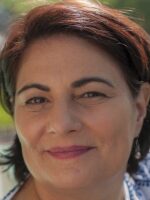Like many minority groups, Arab-Americans are conflicted over how to respond to the U.S. Census. Fear of profiling has made many Arabs reluctant to even fill out the form. And then, there's the question of race: Should they check "white," as many have historically identified themselves, or choose "some other race" and write in "Arab"?
Omar Masry is on a mission to get Arab-Americans to fill out the census form in a different way. His slogan is simple: Check it right — you ain't white.
Masry wants Arab-Americans to get counted as Arabs and not just as part of the white population. So he says when filling out the race question on the census form, check the box that says "white," but also write in "Arab."
"We want to find out how many of us there are, we want to find out how we are doing, and we also want our communities where we live to get the right federal funds," he says.
Masry, whose parents are from Saudi Arabia and Lebanon, sits in the patio area of his favorite Lebanese restaurant in Anaheim, Calif., which has a large Arab-American community. People are playing cards and smoking hookah pipes. The smell of tobacco mixed with apple is thick.
"I remember when I was 17 years old and filling out applications to join the military or to apply for scholarships, and I didn't see a box for 'Arab-American.' Yet, growing up around 'white kids' in high school, you definitely felt different," he says.
The census doesn't do nuance well for some minorities. That bothers many here at the restaurant. They say they're not counted as a minority unless they're standing in line at the airport or some other place where Arabs get special attention
Lola Salamah, a student at nearby California State University, Fullerton, calls herself half-white, half-Egyptian. She wants Arab-Americans to get counted.
"We have a bad reputation — Arabs in general — and we aren't heard. And if we are heard, maybe we could show more positive things — more than the negative things that are portrayed for us," Salamah says.
Fighting Mistrust In The Community
The census is making a big push this year to count Arab-Americans. In California, it hired Rashad Al-Dabbagh to get the word out.
Dabbagh is at a meeting of the nonpartisan Network of Arab-American Professionals. They're planning the group's annual gala, and Dabbagh has scored a chance to speak about the census at the well-attended event.
He says there is a lot of fear in the Arab community when it comes to giving the federal government personal information — especially in Southern California, where there is much mistrust of the FBI. Last year, an alleged FBI informant was discovered in a local mosque.
But Dabbagh says he just tries to hammer home the message that information given to the census stays with the census.
"You already share this information and more with the DMV, for example, [or] with your credit card companies. You have more information up on Facebook, so there is nothing really to be fearful of," he says.
Getting The Count Right
According to the last census, there are about 1.2 million Arab-Americans living in the U.S.
But Helen Samhan of the Arab American Institute says that number is too low. Her group, using private surveys and immigration data, puts the number at 4 million.
Samhan says she hopes that the write-in campaign will show the need for a better way to count Arab-Americans.
"So that we can actually look forward to much more universally acceptable data — data that represents the fullest count of our population," Samhan says.
Getting the fullest count is always a challenge. Every culture has its procrastinators.
Back at the Lebanese restaurant, Louis Khayat, a Palestinian-American, admitted that his census form is sitting unopened on his desk at home. But he said getting interviewed by NPR has inspired him to fill it out.
Copyright 2022 NPR. To see more, visit https://www.npr.org. 9(MDAzMjM2NDYzMDEyMzc1Njk5NjAxNzY3OQ001))






